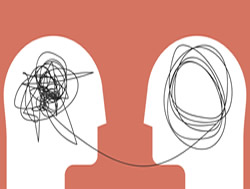Karen Gately* says the stigma and shame associated with poor mental health often prevents people from seeking help and letting go of that stigma has never been more important.
 The first time I was diagnosed with depression and anxiety the strongest emotion I felt was embarrassment.
The first time I was diagnosed with depression and anxiety the strongest emotion I felt was embarrassment.
When my husband shared ‘the news’ with another family member I was devastated, convinced what would follow was unwanted pity and ultimately loss of respect from people I care about.
What I’ve learned is that I’m not alone and I’m far from unique.
Often I meet people who are or have in the past battled mental illness and felt similarly ashamed and wanting to keep their struggles to themselves.
According to the Black Dog Institute 54 per cent of people with mental illness do not access any treatment.
Standing in the way of many people getting the support they need is the undeniable stigma associated with mental illness.
Thankfully many more people are starting to unashamedly acknowledge their own battles and over time hopefully compassion will grow.
Waiting for that day to arrive however isn’t a wise strategy for resolving mental health challenges you face today.
By the end of March 2020 Beyond Blue and Lifeline were already reporting increases of approximately 30 per cent in demand for their services.
With three in four (74 per cent) Australians having never used counselling services, as a community we urgently need to move past being afraid to acknowledge and speak up when we’re not OK.
While we can’t control what other people think, but we can choose how we feel about our own vulnerability and imperfections.
When we accept the reality of being human and recognise the ignorance associated with mental illness stigma, we free ourselves to be OK with not being OK, and get the help we need.
Developing stronger self-respect and compassion is key to navigating you way back from mental illness.
While of course far easier said than done, keeping other people’s opinions of our struggles in their place and being kind to ourselves is essential.
Start by accepting the reality that most people at times struggle to maintain resilience or the emotional strength to keep striving.
Over the years I’ve worked with many talented, optimistic, passionate and successful people, who have suddenly found themselves unable to get out of bed, let alone keep up the pace their job is demanding of them.
Mental illness and mental strength are not mutually exclusive.
At every level of an organisations hierarchy I meet people who are struggling to perform because life has become too much.
My own life experiences have proven to me that it’s entirely possible to be both a strong and capable person, while at the same time struggling to win the fight for mental health.
I’ve called Lifeline and told them I don’t want to keep going.
I’ve hidden under my blankets and cried for days, followed by long periods of simply staying there until life felt more doable.
In stark contrast to those times however, I’ve also won a gold medal at a World Karate Championships, earned a 3rd dan black belt, and found the courage to leave the corporate world to start my own business while providing for a young family.
None of those things would have been possible if I had allowed the mental health challenges I’ve faced throughout my life to define my potential.
Even during some of the ‘good times’, when to other people it seemed like things were going very well for me, I’ve felt lost, helpless, uncertain, anxious, depressed.
I recall very clearly struggling to feel anything positive, despite having just learned a long-time career dream had come true.
What I’m most proud of is the times I’m dragged myself out of that dark world, back into the light where I love life.
Letting go of shame will help you to ask for the help you need to feel OK again.
Whether it be talking to empathetic loved ones, or leveraging the guidance of a coach or psychologist, speaking up is the first step toward no longer feeling alone.
It really is OK to not be OK, its just not wise to stay in that space without reaching out for help.
*Karen Gately is the founder of Corporate Dojo, and a leadership and people-management specialist.
This article first appeared at womensagenda.com.au











